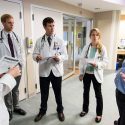Interim chancellor’s memo to lawmakers regarding proposed fetal tissue ban
Here is the text of a memo sent by UW–Madison Interim Chancellor David Ward to all members of the state Legislature regarding a bill that would ban the acquisition and use of fetal tissue in scientific research:
Wisconsin Assembly Bill 214/Senate Bill 172 would ban the acquisition and utilization of “fetal body parts,” defined as materials derived from an induced abortion, for research and transplantation. The bill would affect both fetal tissue and cells derived from fetal tissue, which would hamper a wide variety of promising biomedical and basic scientific research at UW–Madison and eliminate ongoing studies such as those involving child development, cancer and infectious diseases. This, despite the fact that the federal government permits, regulates and funds fetal-tissue research.
Our major concern with the legislation is subsection (b) of s. 146.345(2m), which bans the provision, receipt or use of fetal tissue and cells in research, even when the tissue or cells were provided or obtained without profit. This is tissue that would otherwise be discarded and instead is being used for valuable research into understanding the causes, and developing potential treatments for, conditions such as miscarriage, fetal growth restriction, preeclampsia, childhood leukemia, transplant rejection, and degenerative and autoimmune diseases such as Parkinson’s and diabetes. In prohibiting the use of such essential tissues and cells, the bill goes much farther than federal statutes that permit use of fetal tissue in research, so long as the tissue is not sold for profit. There is nothing currently illegal or unethical about the research use of fetal tissue on the UW–Madison campus.
As you know, biomedical research is a significant part of the research portfolio on our campus. Currently, at least eight UW–Madison investigators use fetal tissue in their research, and hundreds of other investigators are using cell lines originally derived — often decades ago — from fetal tissue. That research continues to get us closer to solving pressing health issues; it is research that gives us hope for a better future; it is research that can improve the lives of not only our state’s citizens but people everywhere.
The research that uses fetal tissue is well-established science and has produced numerous treatments, as well as vaccines for preventing a variety of horrible diseases. The human polio vaccine, for example, would not have been possible without cells of fetal origin. Other vaccines for rabies, chicken pox, German measles and hepatitis A were all developed with the help of fetal-derived cells. This is proven science in the best interest of human health and should not be inhibited.
While research at UW–Madison continues to lead to discoveries that improve our health and quality of life, it is important to also note that research at UW–Madison has a significant economic impact on Wisconsin. Last year, for instance, research at UW–Madison brought nearly $1 billion in research funding to the state of Wisconsin, much of it for biomedical research. This research fosters significant economic development in our state, and the resulting technologies are brought to market with the active support of entities such as the Wisconsin Alumni Research Foundation and the many spinoff companies that have emerged from the scientific enterprise on our campus.
This legislation would have far-reaching and negative effects on the university’s research enterprise, across Wisconsin’s biomedical community, and on human beings at all stages of life. For these reasons, we urge you to oppose Assembly Bill 214/Senate Bill 172.
Tags: health & medicine, research, state relations



